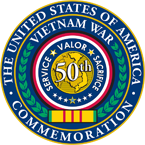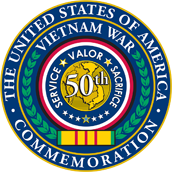Specialist Four Donald P. Sloat
- hometown
- Coweta, Oklahoma
- born
- February 1949
- enlistment date
- March 1969
- unit
- 3rd Platoon, Delta Company, 2nd Battalion, 1st Infantry Regiment, 196th Light Infantry Brigade, Americal Division
- military occupation (mos)
- 11B - Infantry Machine Gunner
- tour of duty
- Republic of Vietnam, 1969 - 1970
After attending Northeastern Oklahoma A&M College in Miami, Oklahoma, Specialist Four Donald P. Sloat enlisted in the Army March 19, 1969, at the age of 20. Upon completion of his initial training at Fort Polk, Louisiana, he was assigned as an M60 Machine Gunner with 2nd Battalion, 1st Infantry Regiment, 196th Light Infantry Brigade, Americal Division, in the Republic of Vietnam, on Sept. 25. 1969
He was killed in action Jan. 17, 1970, a month before his 21st birthday.
Sloat's awards and decorations include the Bronze Star Medal with "V" Device, the Purple Heart, the Army Commendation Medal with "V" Device, the Army Good Conduct Medal, the National Defense Service Medal, the Vietnam Service Medal with two Bronze Service Stars, the Republic of Vietnam Campaign Medal with "60" Device, the Republic of Vietnam Gallantry Cross with Palm Device, the Republic of Vietnam Gallantry Cross Unit Citation with Palm Device, the Combat Infantryman Badge, Expert Badge with Rifle Bar, Sharpshooter Badge with Machinegun Bar, and Marksman Badge with Auto Rifle Bar.

“I was only five to eight feet behind Don, when the grenade went off. His act saved my life.”
Former Pfc. DeWayne C. Lewis Jr., a rifleman, on patrol with Sloat, on Jan. 17, 1970
The Battle
- area of operation
- Republic of Vietnam
- date of action
- Jan. 17, 1970
- position
- Machine Gunner
Specialist Four Donald P. Sloat distinguished himself by acts of gallantry and intrepidity at the risk of his life, above and beyond the call of duty, while serving as a machine gunner with 3rd Platoon, Company D, 2nd Battalion, 1st Infantry Regiment, 196th Light Infantry Brigade, Americal Division, during combat operations against an armed enemy in the Republic of Vietnam, Jan. 17, 1970.
D Company operated out of Fire Support Base Hawk Hill in an area of I Corps. They were located south and southwest of Danang providing security for local villages and conducting regular searches for NVA units. The territory they patrolled stretched from the coastal lowlands to the mountains and jungle. North Vietnamese and Viet Cong activity was common in the area, and D Company suffered regular casualties from snipers and booby traps.
On the morning of Jan. 17, 1970, Sloat's squad was conducting a patrol, serving as a blocking element in support of tanks and armored personnel carriers from F Troop in the Que Son valley. As the squad moved through dense up a small hill in file formation, the lead Soldier tripped a wire attached to a hand grenade booby-trap, set up by enemy forces.
When the grenade rolled down the hill toward Sloat, he had a choice. He could hit the ground and seek cover, or pick up the grenade and throw it away from his fellow Soldiers. After initially attempting to throw the grenade, Sloat realized that detonation was imminent, and that two or three men near him would be killed or seriously injured if he couldn't shield them from the blast. In an instant, Sloat chose to draw the grenade to his body, shielding his squad members from the blast, and saving their lives.
Sloat's actions define the ultimate sacrifice of laying down his own life in order to save the lives of his comrades.
Specialist Four Donald P. Sloat's extraordinary heroism and selflessness are in keeping with the highest traditions of military service, and reflect great credit upon himself, his unit, and the United States Army.
President Barack Obama awards the Medal of Honor to Dr. Bill Sloat, the brother of posthumous recipient, Specialist Four Donald Sloat at the White House, Sept. 15, 2014.
President Barack Obama awards the Medal of Honor to Dr. Bill Sloat, the brother of posthumous recipient, Specialist Four Donald Sloat at the White House, Sept. 15, 2014.
The 196th Infantry Brigade
“Chargers”
The brigade suffered 1,188 Soldiers killed in action, and 5,591 wounded in action, in Vietnam.
The 196th Light Infantry Brigade "Chargers" served in the Republic of Vietnam from July 15, 1966, through June 29, 1972. The unit was first posted in the western portion of the III Corps Tactical Zone. It initiated Operation Attleboro into War Zone C, of Tay Ninh Province, which developed into a major action after a large enemy base camp was uncovered, Oct. 19, 1966.
In April 1967, the brigade was selected, along with the 1st Brigade, 101st Airborne Division, and the 3rd Brigade, 25th Infantry Division, to form a provisional division-sized unit called Task Force Oregon, and the unit was moved to the I Corps Tactical Zone. The brigade stayed with this command, which was converted into the 23d Infantry Division (Americal), on Sept. 25, 1967.
The 196th Light Infantry Brigade officially joined this division on Feb. 15, 1969. It operated throughout northern Vietnam. After the division closed out of Vietnam on Nov. 29, 1971, the 196th Light Infantry Brigade was reconstituted as a separate (provisional) brigade-sized element, and was responsible for safeguarding the same area of operations.
In April 1971, the brigade was relocated to Da Nang, for major port security duties. It finally departed Vietnam as the last U.S. Army combat brigade to leave in Increment XII of the U.S. Army withdrawal.
The brigade suffered 1,188 Soldiers killed in action, and 5,591 wounded in action, in Vietnam.

Distinctive Unit Insignia
The distinctive unit insignia was approved on March 1, 1966.

